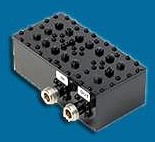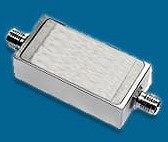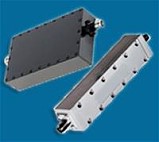
Press Release Archives:
2026 | 2025 |
2024 |
2023 |
2022
2021 |
2020 |
2019 |2018 | 2017 | 2016 |
2015
Content is copyright of company represented. Page format, custom text and
images are RF Cafe copyright - do not distribute. Note: Posting of press releases costs $100 each for non-advertisers.

Anatech Electronics, an RF and microwave filter company, has introduced a new
line of suspended stripline and waveguide type RF filters. Sam Benzacar wrote as
part of Anatech's June newsletter about his impressions of the IMS2019 trade show
in Boston. As you might guess, the main topic is 5G and the plethora of technologies
that stand to benefit from the incredible amount of bandwidth assigned to it over
many heretofore largely unused frequency bands. That is part of the challenge, and
the result will no doubt be the conquering of discouraging and difficult implementation
issues. Also included are a few news headlines related to Anatech's core business
of designing and manufacturing filters.
A Word from Sam Benzacar
 IMS2019
By Sam Benzacar
I've now exhibited at the IMS2019 International Microwave Symposium, and many
many others in previous years (can't reveal my age), which over time covered everything
from the emergence of GaAs and the MMIC, to all the generations of cellular, the
high and lows of the defense budget, and the rise of GaN, among others. But this
year's show in Boston had one very significant difference: Yes, it was 5G, to no
one's surprise, but until now all vendors could promote were solutions for 5G when
it arrived, and now that it's almost here should have a huge impact on the microwave
industry.
 That's
not to say 5G was the only interesting topic at this year's IMS, as advances in
almost every technology were represented, from small-signal and RF power devices,
to antennas, materials, design tools, and many other technologies. Of course, not
all of them will reap major benefits from the wireless applications that 5G will
enable for the first time. And it's arguable that semiconductor vendors will see
the most benefit of all, as they serve so many of those applications. However, 5G
is challenging the industry to develop solutions it's never had to tackle before. That's
not to say 5G was the only interesting topic at this year's IMS, as advances in
almost every technology were represented, from small-signal and RF power devices,
to antennas, materials, design tools, and many other technologies. Of course, not
all of them will reap major benefits from the wireless applications that 5G will
enable for the first time. And it's arguable that semiconductor vendors will see
the most benefit of all, as they serve so many of those applications. However, 5G
is challenging the industry to develop solutions it's never had to tackle before.
One of those challenges is how to make use of millimeter-wave spectrum for terrestrial
wireless applications. As most readers know, propagation at these frequencies makes
communications almost impossible, except over very short and line-of-sight distances.
But 5G not only has a mandate to use these frequencies, it needs them if low-latency,
gigabit-per-second downstream data rates are to be achieved. That will require truly
enormous numbers of small cells both indoors and outdoors everywhere coverage must
be provided.
It will also require the use of advanced antenna technologies including massive
multiuser MIMO, digital beamforming, as well as the first use of phased-array architectures
such as AESA that are currently the domain of defense radars. Papers at IMS this
year as well as some exhibits focused on advances in millimeter-wave technology,
from the device level to complete chipsets.
Integrating millimeter-wave capability and phased-array antennas in small cell
base stations is difficult enough, but in a smartphone is a vastly greater challenge.
It's not just because there is little internal real estate available, but that signals
at millimeter-wave frequencies are attenuated by almost anything placed in their
path – like your hand. And unlike fixed terminals whose operating environment is
reasonably static, smartphones are operated in an unlimited number of positions.
To summarize, IMS in Boston was a terrific experience, and I only wish I had
the time to attend more sessions, as they provided interesting solutions to the
many hurdles the industry will need to surmount to bring the full capabilities of
5G to fruition.
Carbon Nanotube Antennas?
 Researchers
have tested antennas made of "shear-aligned" nanotube films that matched the performance
of copper while being thinner as well. Lead author Amram Bengio of the results presented
in the Journal of Applied Physics performed the research while earning his doctorate
at Rice University. The antennas were tested at the National Institute of Standards
and Technology facility in Boulder, Colorado. Radiation efficiency measurements
of microstrip patch antennas had radiation efficiency of 94% at 10 and 14 GHz, equivalent
to copper antennas. Continued work will focus on aligned carbon nanotube antennas
for aerospace industry as well as for 5G Researchers
have tested antennas made of "shear-aligned" nanotube films that matched the performance
of copper while being thinner as well. Lead author Amram Bengio of the results presented
in the Journal of Applied Physics performed the research while earning his doctorate
at Rice University. The antennas were tested at the National Institute of Standards
and Technology facility in Boulder, Colorado. Radiation efficiency measurements
of microstrip patch antennas had radiation efficiency of 94% at 10 and 14 GHz, equivalent
to copper antennas. Continued work will focus on aligned carbon nanotube antennas
for aerospace industry as well as for 5G
 5G Hype Continues Apace 5G Hype Continues Apace
AT&T, which received universal guffaws last year when it branded its LTE-Advanced
service "5G Evolution" and launched a 19-city 5G network still has no smartphones
to offer customers. Nevertheless, CEO John Donovan told attendees on a Credit Suisse
conference call that the company is the "world leader" in 5G. AT&T says its
initial 5G service costs $70 per month for just 15 Gbytes of data and plans to have
29 cities operational by the end of the year.
G/ATOR GaN Radar Passes Crucial Test
 Northrop Grumman's AN/TPS-80 Ground/Air
Task-Oriented Radar (G/ATOR) Blocks 1 and 2 has passed an initial operational test
and evaluation test. The system is a multi-mission AESA radar that provides 360-deg.
coverage, employs digital beam forming, and uses GaN MMICs at each antenna element.
It is designed to detect fixed-wing aircraft, helicopters, cruise missiles, UAS,
rockets, artillery, and mortar rounds. Previous versions used GaAs MMICs but the
latest batch have been upgraded to GaN because of its lower input power, higher
efficiency, and higher RF output power. G/ATOR is currently the only GaN-based ground-based
radar in the DoD inventory. Northrop Grumman's AN/TPS-80 Ground/Air
Task-Oriented Radar (G/ATOR) Blocks 1 and 2 has passed an initial operational test
and evaluation test. The system is a multi-mission AESA radar that provides 360-deg.
coverage, employs digital beam forming, and uses GaN MMICs at each antenna element.
It is designed to detect fixed-wing aircraft, helicopters, cruise missiles, UAS,
rockets, artillery, and mortar rounds. Previous versions used GaAs MMICs but the
latest batch have been upgraded to GaN because of its lower input power, higher
efficiency, and higher RF output power. G/ATOR is currently the only GaN-based ground-based
radar in the DoD inventory.
Sony's New Device for Low-Power Networks
 Sony's Eltres low-power wide area network will
use small ICs and and antennas to relay a sensor data to a base station that can
more than 60 mi away. Sony uses an example in which a drone monitoring an offshore
platform could use the network to transmit location and sensor data. It's first-generation
device, the CXM1501GR, along with a 20-mW RF power amplifier can transmit a 128-bit
signal at up to 6.35 Kb/s moving at more than 60 mph. It can automatically switch
between 23 channels between 923.6 MHz and 928 MHz, and to circumvent interference
it repeats each signal four times. The chip measures 16 x 16 and will operate from
one coin-cell battery for several months. Sony's Eltres low-power wide area network will
use small ICs and and antennas to relay a sensor data to a base station that can
more than 60 mi away. Sony uses an example in which a drone monitoring an offshore
platform could use the network to transmit location and sensor data. It's first-generation
device, the CXM1501GR, along with a 20-mW RF power amplifier can transmit a 128-bit
signal at up to 6.35 Kb/s moving at more than 60 mph. It can automatically switch
between 23 channels between 923.6 MHz and 928 MHz, and to circumvent interference
it repeats each signal four times. The chip measures 16 x 16 and will operate from
one coin-cell battery for several months.
SpaceX Launches First Broadband Satellites
Elon Musk, never one to "go small" has initiated its first efforts to provide
broadband from space, with the launch by SpaceX of 60 of its Starlink satellites
from Cape Canaveral (note their dense packing in the spacecraft). That's just the
beginning though, as the plan is to have up to 12,000 of them in geostationary orbit,
presumably making inexpensive service available anywhere. That would be good news
for the more than 20 million people in the U.S. and far more elsewhere who still
have nothing approaching decent Internet access.
Anatech Electronics Introduces a New Line of Suspended Stripline and
Waveguide Type RF Filters
Anatech Electronics Introduces a New Line of Suspended Stripline and
Waveguide Type RF Filters
Check out Our Filter Products



Cavity Band Pass Filters
LC Band Pass Filters Cavity Bandstop/Notch Filter
About Anatech Electronics
Anatech Electronics, Inc. (AEI) specializes in the design and manufacture of
standard and custom RF and microwave filters and other passive components and subsystems
employed in commercial, industrial, and aerospace and applications. Products are
available from an operating frequency range of 10 kHz to 30 GHz and include cavity,
ceramic, crystal, LC, and surface acoustic wave (SAW), as well as power combiners/dividers,
duplexers and diplexers, directional couplers, terminations, attenuators, circulators,
EMI filters, and lightning arrestors. The company's custom products and capabilities
are available at www.anatechelectronics.com.
Contact:
Anatech Electronics, Inc. 70 Outwater Lane Garfield, NJ 07026 (973)
772-4242
sales@anatechelectronics.com
Posted June 14, 2019
|






 That's
not to say 5G was the only interesting topic at this year's IMS, as advances in
almost every technology were represented, from small-signal and RF power devices,
to antennas, materials, design tools, and many other technologies. Of course, not
all of them will reap major benefits from the wireless applications that 5G will
enable for the first time. And it's arguable that semiconductor vendors will see
the most benefit of all, as they serve so many of those applications. However, 5G
is challenging the industry to develop solutions it's never had to tackle before.
That's
not to say 5G was the only interesting topic at this year's IMS, as advances in
almost every technology were represented, from small-signal and RF power devices,
to antennas, materials, design tools, and many other technologies. Of course, not
all of them will reap major benefits from the wireless applications that 5G will
enable for the first time. And it's arguable that semiconductor vendors will see
the most benefit of all, as they serve so many of those applications. However, 5G
is challenging the industry to develop solutions it's never had to tackle before. Researchers
have tested antennas made of "shear-aligned" nanotube films that matched the performance
of copper while being thinner as well. Lead author Amram Bengio of the results presented
in the Journal of Applied Physics performed the research while earning his doctorate
at Rice University. The antennas were tested at the National Institute of Standards
and Technology facility in Boulder, Colorado. Radiation efficiency measurements
of microstrip patch antennas had radiation efficiency of 94% at 10 and 14 GHz, equivalent
to copper antennas. Continued work will focus on aligned carbon nanotube antennas
for aerospace industry as well as for 5G
Researchers
have tested antennas made of "shear-aligned" nanotube films that matched the performance
of copper while being thinner as well. Lead author Amram Bengio of the results presented
in the Journal of Applied Physics performed the research while earning his doctorate
at Rice University. The antennas were tested at the National Institute of Standards
and Technology facility in Boulder, Colorado. Radiation efficiency measurements
of microstrip patch antennas had radiation efficiency of 94% at 10 and 14 GHz, equivalent
to copper antennas. Continued work will focus on aligned carbon nanotube antennas
for aerospace industry as well as for 5G  5G Hype Continues Apace
5G Hype Continues Apace  Northrop Grumman's AN/TPS-80 Ground/Air
Task-Oriented Radar (G/ATOR) Blocks 1 and 2 has passed an initial operational test
and evaluation test. The system is a multi-mission AESA radar that provides 360-deg.
coverage, employs digital beam forming, and uses GaN MMICs at each antenna element.
It is designed to detect fixed-wing aircraft, helicopters, cruise missiles, UAS,
rockets, artillery, and mortar rounds. Previous versions used GaAs MMICs but the
latest batch have been upgraded to GaN because of its lower input power, higher
efficiency, and higher RF output power. G/ATOR is currently the only GaN-based ground-based
radar in the DoD inventory.
Northrop Grumman's AN/TPS-80 Ground/Air
Task-Oriented Radar (G/ATOR) Blocks 1 and 2 has passed an initial operational test
and evaluation test. The system is a multi-mission AESA radar that provides 360-deg.
coverage, employs digital beam forming, and uses GaN MMICs at each antenna element.
It is designed to detect fixed-wing aircraft, helicopters, cruise missiles, UAS,
rockets, artillery, and mortar rounds. Previous versions used GaAs MMICs but the
latest batch have been upgraded to GaN because of its lower input power, higher
efficiency, and higher RF output power. G/ATOR is currently the only GaN-based ground-based
radar in the DoD inventory.  Sony's Eltres low-power wide area network will
use small ICs and and antennas to relay a sensor data to a base station that can
more than 60 mi away. Sony uses an example in which a drone monitoring an offshore
platform could use the network to transmit location and sensor data. It's first-generation
device, the CXM1501GR, along with a 20-mW RF power amplifier can transmit a 128-bit
signal at up to 6.35 Kb/s moving at more than 60 mph. It can automatically switch
between 23 channels between 923.6 MHz and 928 MHz, and to circumvent interference
it repeats each signal four times. The chip measures 16 x 16 and will operate from
one coin-cell battery for several months.
Sony's Eltres low-power wide area network will
use small ICs and and antennas to relay a sensor data to a base station that can
more than 60 mi away. Sony uses an example in which a drone monitoring an offshore
platform could use the network to transmit location and sensor data. It's first-generation
device, the CXM1501GR, along with a 20-mW RF power amplifier can transmit a 128-bit
signal at up to 6.35 Kb/s moving at more than 60 mph. It can automatically switch
between 23 channels between 923.6 MHz and 928 MHz, and to circumvent interference
it repeats each signal four times. The chip measures 16 x 16 and will operate from
one coin-cell battery for several months. 







